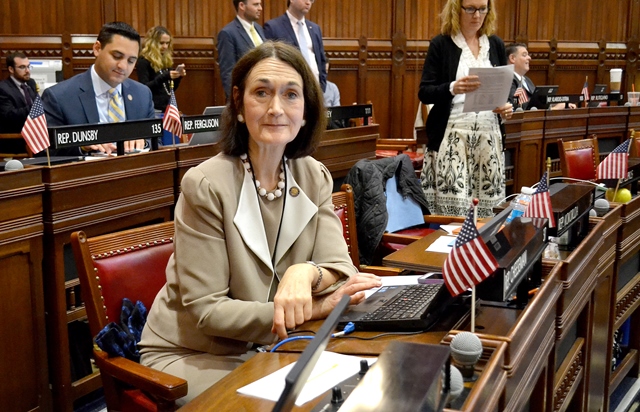

HARTFORD – State Representative Holly Cheeseman (R-37), who recently encouraged constituents to attend a public hearing being held this week by the Connecticut Department of Energy and Environmental Protection (DEEP) and Public Utilities Regulatory Authority (PURA), has submitted testimony of her own in regards to the governor’s Executive Order 59, requiring a study of Millstone.
Please find Rep. Cheeseman’s testimony below:

Thank you for this opportunity to submit written comments for the record on Docket No. 17-07-32 pursuant to the Governor’s Executive Order No. 59.
Let me begin by stating that I am the State Representative for the 37th District, which is comprised of East Lyme and Salem. East Lyme is one of the towns adjacent to Waterford, the home to Millstone Power Plant, the largest power generating facility and only nuclear power facility left in Connecticut. In a state that already has the highest electricity rates in the lower forty eight states, (https://www.eia.gov/state/analysis.php?sid=CT) the prospect of the Millstone Power plant closing should be unthinkable.
Dominion Power’s Millstone Plant supplies nearly 60% of the electricity used by residents, businesses, and industries in the State of Connecticut. In addition, it supplies 98% of the carbon dioxide free power in the state. This happens twenty-four hours a day, seven days a week. Carbon free renewable sources of power supply 4% of the state’s electricity; of that 4%, biomass from municipal waste supplies three fifths and solar only one fifth, with hydropower making up the rest. (https://www.eia.gov/state/analysis.php?sid=CT) If Millstone were to close, the power it supplies would have to be provided by natural gas fired plants, which would increase carbon emissions by 25%. The state’s commitment to achieving and surpassing climate and carbon reduction goals is simply not possible in the foreseeable future without the electricity Millstone supplies.
From an economic standpoint, Millstone is equally irreplaceable. The Norwich-New London-Westerly region had annual employment growth of only .5% from June 2016 to June 2017, and ranked 310 out of 388 metro areas nationwide, according to the U.S. Bureau of Labor Statistics. In an area that had the ninth worst recovery in the nation, the premature closure of Millstone would be a crippling blow. In my district alone, there are 178 Millstone employees and an additional 58 retirees. The average package, for its 1080 employees, including salary, benefits and overtime, is $168,365. The plant also employs 400 full time contractors. By contrast, at the Dominion owned Somers Solar Center, there are zero full-time employees; and one part-time contractor; the Dominion’s Energy Bridgeport Fuel Cell, there are zero full-time employees and no part-time contractors. With an economic impact on the state of $1.5 billion each year, this plant must be preserved.
Despite claims to the contrary, Dominion could easily end its commitment to ISO New England, pay a fine, and cease to operate. Once the decision is made to decommission and the NRC has been notified, there is no going back. The time for a study is long past. Action to secure Connecticut’s supply of clean affordable electricity by allowing Millstone to bid directly for longer-term contracts is the way forward.
Sincerely,
Holly Cheeseman
State Representative, 37th District
East Lyme, Niantic, Salem
